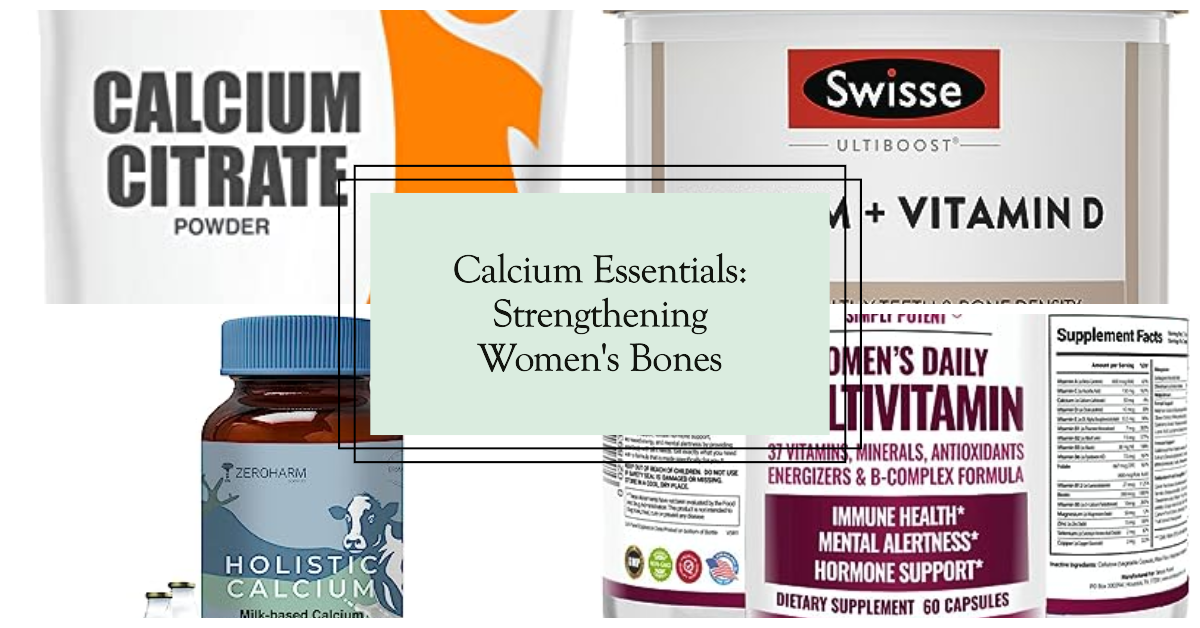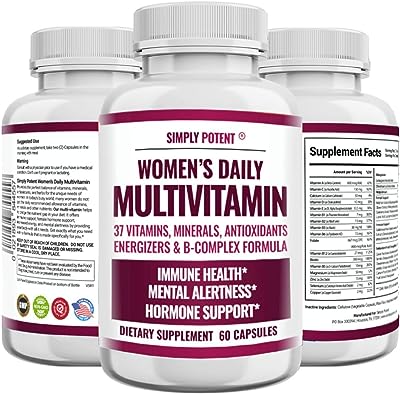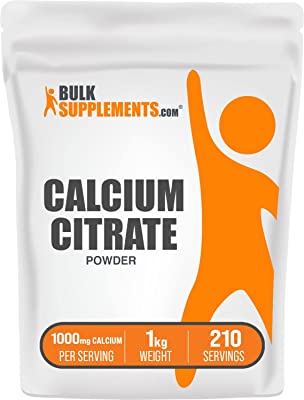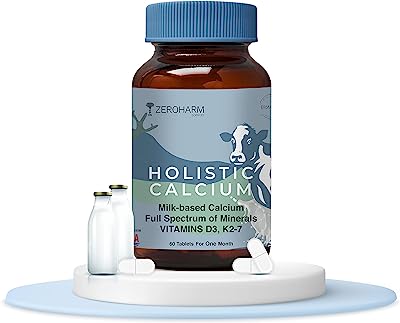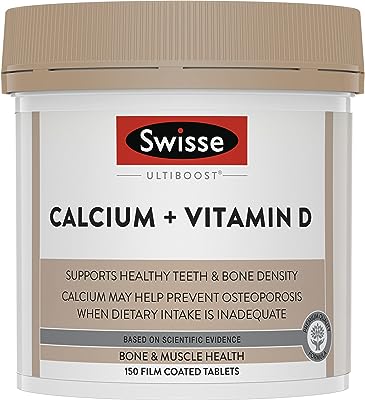Introduction
Hey, ladies! Today, we’re going to talk about something really important – strengthening your bones. We all know that women are more prone to bone-related issues, such as osteoporosis, as we age. But fear not, because there’s a secret weapon that can help us combat this problem – calcium. In this article, we’ll be diving into the essentials of calcium and how it can keep our bones strong and healthy. So grab a cuppa, settle in, and let’s get started!
Key Takeaways
- Calcium is essential for women’s bone health, especially as they age, to combat conditions like osteoporosis and maintain bone density.
- Women require different levels of calcium based on their age, with general recommendations of 1,000 mg per day for ages 19-50 and 1,200 mg for those above 50 or during pregnancy/breastfeeding.
- Apart from dairy, calcium can be sourced from leafy greens, fortified foods, and supplements, while other nutrients like vitamin D, magnesium, and vitamin K aid in its absorption.
- Lifestyle choices, including physical activity and avoiding excessive caffeine, smoking, and alcohol, can influence calcium absorption and overall bone health.
- Monitoring calcium levels and bone density through tests such as the DEXA scan is crucial for those at higher risk of osteoporosis or bone loss.
Importance of Calcium for Women’s Bone Health
Calcium is an essential mineral that plays a crucial role in maintaining bone health. Particularly for women, calcium is of paramount importance as they are more prone to osteoporosis, a condition characterized by weak and brittle bones. In this article, we will explore why calcium is so vital for women’s bone health, the recommended daily intake, and the various sources of calcium.
Women and Osteoporosis
Osteoporosis is a condition that affects primarily women, especially as they age. It is characterized by the loss of bone density, making bones fragile and prone to fractures. Hormonal changes, specifically a drop in estrogen levels, greatly contribute to the development of osteoporosis in women. This is why it is crucial for women to prioritize their bone health and ensure an adequate intake of calcium.

Photo: Amazon
Calcium and Bone Health
Calcium is the main mineral found in bones, accounting for about 99% of its total content. It provides structure and strength to the skeleton and is constantly being used to maintain bone health. When calcium intake is insufficient, the body begins to draw calcium from the bones, leading to a decrease in bone density over time. This is why it is crucial for women to ensure an adequate daily intake of calcium to prevent the onset of osteoporosis and maintain strong bones.
Recommended Daily Calcium Intake for Women
The recommended daily calcium intake for women varies based on age and other factors. Generally, it is recommended that women between the ages of 19 to 50 consume around 1,000 milligrams (mg) of calcium per day. However, for women above the age of 50 and those who are pregnant or breastfeeding, the recommended intake increases to 1,200 mg per day. It is important to note that these values may fluctuate based on individual health conditions, so it is best to consult with a healthcare professional for personalized recommendations.
Good Sources of Calcium
While many people associate calcium primarily with dairy products, there are also other excellent sources of this mineral that can be incorporated into a woman’s diet to boost calcium intake.
Dairy Products
Dairy products such as milk, cheese, and yogurt are well-known for their high calcium content. For example, a cup of milk typically contains around 300 mg of calcium. Low-fat or fat-free options can be chosen to minimize saturated fat intake and still benefit from the calcium they provide. However, it is essential to note that not all individuals can tolerate dairy or may have dietary restrictions, so it is important to have alternative sources as well.
Leafy Greens
Leafy green vegetables like kale, broccoli, and spinach are excellent sources of calcium. These nutrient-packed foods not only provide calcium but are also rich in other vitamins and minerals essential for overall health. Incorporating leafy greens into your daily diet, whether through salads or cooked dishes, can significantly contribute to your calcium intake.
Fortified Foods
Fortified foods are products that have had extra nutrients, including calcium, added to them. This can include items like fortified orange juice, almond milk, and even certain types of breakfast cereals. Checking food labels for calcium content and choosing fortified options can be a practical way for women to increase their calcium intake.
Other Nutrients That Aid in Calcium Absorption
While maintaining an adequate calcium intake is important, certain nutrients also play a crucial role in aiding calcium absorption in the body. These include vitamin D, magnesium, and vitamin K.
Vitamin D
Vitamin D is essential for the absorption of calcium in the body. It helps regulate calcium levels and promotes its absorption from the intestines into the bloodstream. Women should aim to obtain vitamin D through safe sun exposure or through dietary sources such as fatty fish (like salmon and mackerel), fortified dairy products, and eggs. In some cases, a vitamin D supplement may be necessary, especially for those with limited sun exposure or underlying deficiencies.
Magnesium
Magnesium is another mineral that plays a vital role in calcium absorption and bone health. It helps convert vitamin D into its active form, which is necessary for calcium absorption. Good sources of magnesium include nuts, seeds, whole grains, and dark chocolate. Adding these foods to your diet can complement calcium intake and support bone health.
Vitamin K
Vitamin K is involved in the activation of proteins that regulate calcium in the body. It helps transport calcium to the bones and prevent its buildup in the arteries. Leafy green vegetables, such as kale and spinach, as well as broccoli and Brussels sprouts, are rich sources of vitamin K. Incorporating these foods into your diet can support calcium absorption and contribute to overall bone health.
Calcium Supplements
In some cases, meeting calcium requirements solely through diet may be challenging. This is where calcium supplements can play a role. They can be an effective way to boost calcium intake and ensure that women meet their daily requirements. However, it is important to understand different types of supplements, choose the right one, and be aware of potential side effects.
Types of Calcium Supplements
There are various types of calcium supplements available, including calcium carbonate and calcium citrate. Calcium carbonate requires stomach acid for absorption and is best taken with a meal. Calcium citrate, on the other hand, can be taken with or without food and is easily absorbed in the body. Your healthcare provider can guide you in choosing the appropriate calcium supplement based on your specific needs.
Choosing the Right Calcium Supplement
When choosing a calcium supplement, it is important to consider factors such as absorption, dosage, and any potential interactions with other medications or health conditions. It is recommended to consult with a healthcare professional to determine the right supplement and dosage based on individual needs.
Calcium Supplements and Their Potential Side Effects
While calcium supplements can be beneficial, there are potential side effects to be aware of. These can include constipation, gas, and bloating. To minimize these side effects, it is important to follow the recommended dosage instructions, drink plenty of water, and maintain a balanced diet.
Lifestyle Factors that Affect Calcium Absorption
In addition to diet and supplementation, several lifestyle factors can impact calcium absorption in the body. By incorporating certain habits and making informed choices, women can optimize their calcium absorption and overall bone health.

Photo: Amazon
Physical Activity and Weight-Bearing Exercises
Engaging in regular physical activity has numerous health benefits, including promoting bone health. Weight-bearing exercises, such as walking, jogging, and weightlifting, help stimulate bone growth and increase bone density. By incorporating these activities into your routine, you can enhance calcium absorption and strengthen your bones.
Smoking and Alcohol Consumption
Smoking and excessive alcohol consumption can negatively impact calcium absorption. Both these habits can interfere with the body’s ability to effectively absorb and utilize calcium, leading to lower bone density. Therefore, it is crucial for women to limit or avoid smoking and excessive alcohol consumption to maintain optimal bone health.
Caffeine and Calcium
While moderate caffeine consumption does not significantly affect calcium absorption, excessive caffeine intake may hinder calcium balance in the body. It is recommended to limit caffeine intake to minimize any potential interference with calcium absorption. However, it is important to note that specific individual differences may vary, and it is best to consult with a healthcare professional for personalized guidance.
Calcium and Hormonal Changes in Women
Hormonal changes in women, such as those that occur during menopause, pregnancy, and breastfeeding, can have a significant impact on calcium metabolism and bone health. Women should pay attention to their calcium intake during these phases to ensure optimal bone health.
Calcium and Menopause
During menopause, the decline in estrogen levels can accelerate bone loss. It becomes even more crucial for women to increase their calcium intake during this period to maintain bone strength and minimize the risk of developing osteoporosis. Adequate calcium supplementation, along with weight-bearing exercises, can play a vital role in supporting bone health during menopause.
Calcium and Pregnancy
Pregnancy places additional demands on a woman’s body, including higher calcium requirements. Calcium is essential for the development of the baby’s bones and teeth. Pregnant women need to ensure they meet their recommended daily calcium intake to support both their own bone health and that of their growing baby. Prenatal vitamins often contain calcium, but it is advisable to consult with a healthcare provider to determine if additional supplementation is necessary.
Calcium and Breastfeeding
Breastfeeding women also require increased levels of calcium to support the production of breast milk. The body prioritizes the needs of the baby and will pull calcium from the mother’s bones if her intake is insufficient. It is, therefore, important for breastfeeding women to maintain an optimal calcium intake and consider supplements if needed, while also focusing on consuming a variety of nutrient-rich foods.
Calcium Testing and Monitoring
Monitoring calcium levels and bone health is important, especially for women who may be at a higher risk of developing osteoporosis. There are various tests that can be done to assess bone density and calcium levels.

Photo: Amazon
Bone Density Test
A bone density test, also known as a DEXA scan, is a common method to assess bone mineral density. This painless procedure measures the amount of calcium and other minerals in specific bones, typically the hip and spine. It helps identify the presence of osteoporosis or any signs of bone loss. Women at higher risk may benefit from periodic DEXA scans to monitor their bone health.
Calcium Levels in Blood Test
A blood test can measure the levels of calcium in the bloodstream. This test can provide an indication of whether calcium intake is adequate and if there are any imbalances in the body’s calcium levels. It is important to consult with a healthcare professional to determine if a blood calcium test is necessary.
Monitoring Calcium Intake
Keeping track of your daily calcium intake can help ensure that you are meeting your recommended daily requirements. By recording the calcium content of the foods you consume, as well as any supplements you take, you can better monitor your calcium intake and make adjustments as needed. Various mobile applications and online tools are available to help track and manage nutrient intake.
Tips for Increasing Calcium Consumption
Increasing calcium consumption can be easily achieved by incorporating certain strategies into your daily routine.
Meal Planning with Calcium-Rich Foods
Meal planning can play a significant role in ensuring adequate calcium intake. Opt for calcium-rich foods such as dairy products, leafy greens, and fortified foods when creating your meal plans. By incorporating these foods into your meals, you can make it easier to meet your daily calcium needs.
Calcium Supplements with Meals
When taking calcium supplements, it is generally advisable to take them with meals. This allows for better absorption as the stomach acid produced during digestion aids in calcium absorption. Taking supplements with meals can also help reduce any gastrointestinal side effects that may arise.
Any Questions🤔?
Reach out to us! We’re here to clarify and prioritize your well-being. 🌟
Incorporating Calcium-Rich Snacks
Snacks provide an excellent opportunity to increase calcium intake throughout the day. Consider incorporating calcium-rich foods into your snacks, such as yogurt, cheese, or almond butter with celery sticks. These small additions can make a big difference in your overall calcium consumption.

FAQ (Frequently Asked Questions)
Q1: Why is calcium crucial for women’s bone health?
A1: Calcium plays a pivotal role in women’s health as it is the primary mineral responsible for strong bones. Women are more susceptible to osteoporosis, especially after menopause, so adequate calcium intake can prevent bone density loss and maintain skeletal strength.
Q2: How much calcium should women consume daily?
A2: The recommended daily calcium intake varies with age. Generally, adult women aged 19-50 should aim for 1,000 mg daily, while those over 50 should increase their intake to 1,200 mg daily. Always consult with a healthcare provider for individual recommendations.
Q3: Can women get calcium only through supplements?
A3: No, calcium is naturally found in many foods. Dairy products, green leafy vegetables, and certain fish are rich sources. Supplements can help if one’s diet is not providing enough calcium, but it’s essential to get calcium through natural food sources as much as possible.
Q4: Are there side effects to consuming excessive calcium?
A4: Yes, excessive calcium intake can lead to kidney stones, constipation, and impaired absorption of other essential minerals. It’s crucial to stick to recommended levels and consult with a healthcare professional before starting supplements.
Q5: How does vitamin D relate to calcium absorption in women?
A5: Vitamin D plays an essential role in calcium absorption in the gut. Without sufficient vitamin D, the body cannot absorb calcium effectively, which can lead to weakened bones. It’s crucial for women to ensure they’re getting enough of both calcium and vitamin D.
Conclusion
Maintaining optimal bone health is crucial for women, particularly as they age. Calcium plays a vital role in keeping bones strong and preventing the onset of osteoporosis. By understanding the importance of calcium, incorporating calcium-rich foods into your diet, considering supplementation when necessary, and making lifestyle choices that support calcium absorption, you can ensure the health and well-being of your bones. Remember to consult with a healthcare professional for personalized advice and guidance to meet your individual needs. With a comprehensive approach, you can strengthen your bones and prioritize your overall bone health for years to come.
Disclaimer
Please keep in mind that nothing said here should be construed as a substitute for professional medical or financial advice from a qualified financial advisor or a licensed healthcare provider. If you use pharmaceuticals or have concerns after reading the above review information, be sure to speak with a qualified physician or financial expert before making any purchasing decisions. Since the claims made about these products have not been reviewed by the Food and Drug Administration or Health Canada, individual outcomes may differ and cannot be guaranteed. Research that has been approved by the FDA or Health Canada has not attested to the efficacy of these products. These goods do not offer any form of get-rich-quick scheme and are not designed to diagnose, treat, cure, or prevent any ailment. The reviewer disclaims all liability for incorrect pricing. For exact prices, view the product sales page

